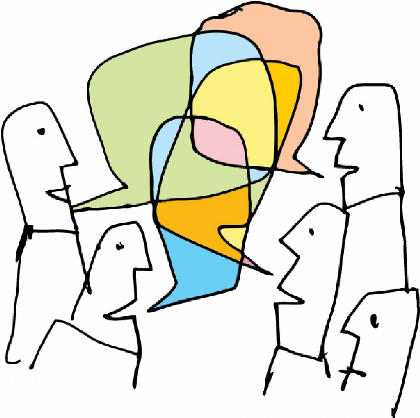Who is Listening?
In 1977 NASA launched Voyager I and Voyager II to fly by Saturn and Jupiter, collecting data that has increased scientists’ knowledge of those planets and our solar system. In 2012, Voyager I reached interstellar space, making it the most distant human-made object in existence. Both spacecraft carry a “time-capsule” called The Golden Record, a 12-inch gold-plated copper disk containing sounds and images selected to portray the story of our world to extraterrestrials. (source: Jet Propulsion Laboratory)
Various labs and universities have transmitted messages into space over the years. Other scientists have setup huge arrays of antennas to listen for transmissions from space. At this point, we do not know if anyone is listening to us. Our antennas have picked up signals from space, but whether these sounds are being intentionally transmitted has not been determined.
But I don’t want to talk about space communication.
Devices and Pets Listen
Sometimes the best listeners in our lives are our pets and our smart devices. We ask Siri about the weather, for directions, for movie suggestions. We ask Google to find a nearby restaurant or Entertainment venue. We ask Alexa to play music or add something to our shopping list. And these devices always respond. They listen to our questions or requests, and they respond. Some may say they are listening too much.
Our pets may not respond to our requests, especially if the pet is a cat, but they generally let us know that they love us and are happy we are there.
Listening professionally
Listening professionally is what I do. When interviewing guests, I am always listening to what they say so I can keep the conversation going and ask thought provoking questions. When I am Coaching clients, I listen for what they say and for what they may not be saying, to help them gain insights into what is holding them back or causing them unease.
My training as a coach taught me to practice active listening, ask powerful questions and acknowledge and validate what is being said and felt.
Non-conversations
It seems that the art of conversation is being lost. How many times have you been to a restaurant and watched groups of people sitting together, but no one is talking. They are all on their devices. Even the children are on their devices. No one is talking and no one is listening. If you do get involved in dinner conversation, is there really listening going on? Is everyone talking at once? Or maybe the conversation goes something like this.

Ted: “My boss is such a jerk. Last week he called me out in front of my co-workers.”
Bob: “My boss never gives me any feedback. I don’t know if he is happy with my work or not.”
Ted: “I am going to start looking for another job. I don’t need to be treated like this.”
Bob: “My clients seem happy with my work, I am hitting my numbers. I am just going to keep doing what I am doing.”
Does it sound like they were responding to each other or were they each having their own conversation? Yes, they were both talking about work, but there was no acknowledgment of what the other person said.
Another familiar conversation could sound like this.
Ann: “I went to the gym today. Managed to do 30 minutes on the treadmill and worked arms and abs for another 30 minutes.”
Lynn: “Oh, well, I am doing 30 minutes of elliptical training every day, with high resistance, and then I do an hour Yoga class twice a week.”
Again, same subject, but this time, Lynn is one-upping Ann. No acknowledgement of the accomplishment that Ann obviously feels good about.
The truth is most people don’t know how to listen. They listen while thinking about their response. The don’t listen to hear.
Acknowledge and validate
This is one of the most important lessons we learned in coach training. It is not as simple as it sounds, but it is a powerful way of letting someone know they have been heard.
Let’s go back to the conversations above.
Ted said his boss was a jerk for calling him out in front of co-workers.
Acknowledgement and validation would sound like, “Wow, that must have felt awful. I can see why you are upset with your boss.”
This simple statement gives the person permission to continue with their story because they feel heard. It can help them process what happened and then move on.
In the other conversation, Ann talks about her accomplishments at the gym.
Acknowledgement and validation would sound like “Good for you. Sounds like you are feeling good about pushing yourself to get to the gym and complete your workout.”
How much better do you think that would feel for Ann to hear that response rather than having you tell them how much more you do?
Many times, acknowledging and validating is all that person needs to feel like you are hearing them. They don’t need you to fix them. They don’t need you to one-up them. They don’t need you to tell your version of a similar story. They simply need to be heard. Once they feel heard, it is your turn to share.
Listening is a skill that can be learned, and when you listen you are building intimacy and relationship. This week, why don’t you see how often you can acknowledge and validate when talking with a friend or family member. You may be surprised at how different the interchange feels. You will be giving the other person the gift of being heard.
The post Who is Listening? first appeared on .























